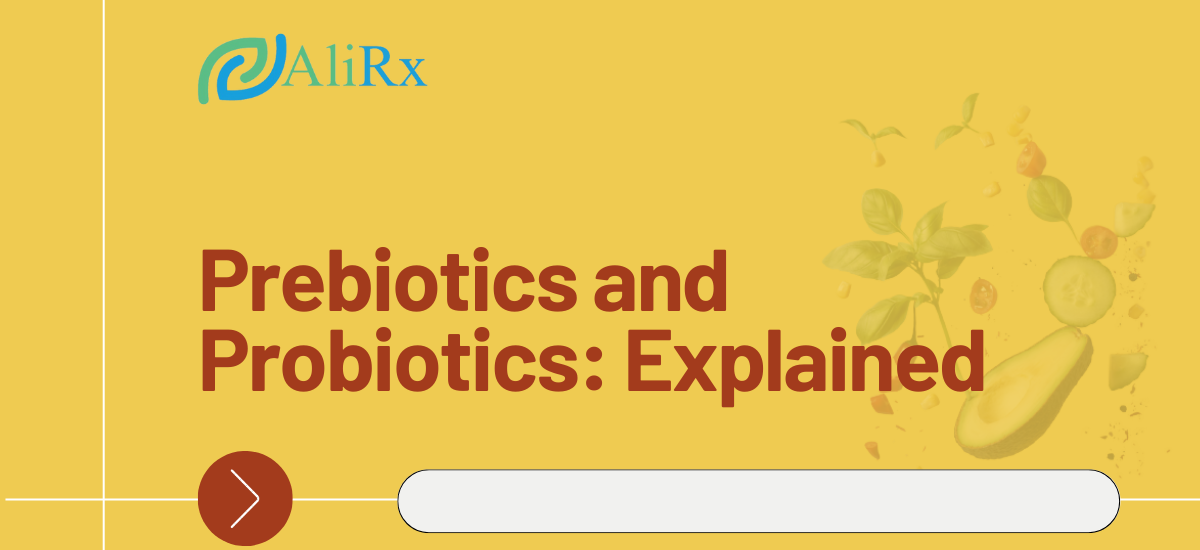Collectively, prebiotics and probiotics can protect you against metabolic diseases.
With a healthy gut microbiota, you are letting your immune system work optimally. Therefore, a balanced diet helps you maintain normal body weight and stop pathogens that make you sick.
In a previous article here in AliRx, you will find how the gut microbiome can affect your other body functions. That’s where prebiotics and probiotics come in. Gut inflammation can be caused by unhealthy gut bacteria and may lead to a compromised immune system. Hence, your body needs food and proper hydration in order to perform well.
It’s important to eat a good amount of prebiotics and probiotics to ensure healthy gut bacteria inside your body. Collectively known as gut microbiota, these gut bacteria perform vital biological functions for human health.
AliRx explains the role of prebiotics and probiotics in your nutrition. Read on to learn how these food sources and supplements can affect your gastrointestinal bacteria and, consequently, avoid health issues.
What are prebiotics?
There are special plant fibers or substances from carbohydrates that help your digestive system work efficiently. These are prebiotics which aid healthy bacteria to grow in your gut. Moreover, they act as a food source – to feed on – for the healthy bacteria living in your gut.
Prebiotics help avoid food from getting stuck in your digestive system which often causes bloating and abdominal cramps. When prebiotics are incorporated in your diet, it may help stop symptoms or triggers of irritable bowel syndrome (IBS).
Prebiotic foods

Many fruits, vegetables, and whole grains are good sources of prebiotics. Other prebiotic foods are:
- Asparagus
- Bananas
- Greens
- Onions
- Soybeans
- Garlic
- Artichokes
- Barley
- Cocoa
- Chicory
- Flaxseed
- Konjac root
- Legumes
- Oats
- Wheat
You can also find products that are fortified with prebiotics such as bread, cereals, cookies, and even baby formula. One way to know that your food has prebiotics in them is to look for the following: chicory fiber, inulin, galactooligosaccharides, fructooligosaccharides, and oligofructose. Many dietary supplements also have them.
Benefits of prebiotics. The main purpose of prebiotics is to improve the overall balance of your gut microflora. While they essentially feed your good gut bacteria, prebiotics help keep the cells lining your gut to be healthy. Prebiotics help absorb calcium and maintain a healthy glycemic index in your body. This is done by improving the rate at which foods cause spikes in your blood sugar. Prebiotics also help you avoid constipation through fermenting food faster in your gut.
What are probiotics?
Probiotics are good bacteria that contain live microorganisms, such as live yeasts, which are good for the digestive system. They naturally live inside your body. Probiotics also serve as the “police” that sustains order and stops any harmful bacteria to colonize in your gut.
For example, Lactobacillus and Bifidobacterium are probiotic bacteria helping maintain the right acidity in your gut. Similarly, there are other edible sources you can consume, as well as supplements, rich in probiotics.
Foods rich in probiotics

Many fermented foods are good sources of probiotics. Note that pasteurization kills bacteria. Therefore, if you need probiotic benefits from these foods, they should be pasteurized. Here’s a list of probiotic foods:
- Yogurts
- Sauerkrauts
- Kimchi
- Kombucha tea
- Kefir
- Unpasteurized pickles
- Pickled vegetables
Benefits. Probiotics primarily maintain normal microflora – what is commonly called “good bacteria” – in your body. There are probiotic supplements with the intention of carrying the bacteria all the way down to your large intestine. Some, on the other hand, may not make it as far as your colon and get mixed in your stomach acid.
There are probiotic foods which are also synbiotic in nature such as cheese and kefir. It means that they contain both prebiotics and probiotics. You’re getting twice the benefits like 1) beneficial bacteria and 2) prebiotic fiber food source to feed your gut bacteria.
Why take prebiotics and probiotics

A person’s gut isn’t usually the first place people consider when seeking help for medical needs. However, recent studies and more general awareness about gut health are gaining more attention. You can have a more preventive approach in promoting a healthy gut ecosystem in your body. This way, you can be more intentional with your food choices and “listen to your gut.”
Both prebiotics and probiotics are beneficial to your body, especially to your gut. But, they are good for the gut in different ways as mentioned above. Bottomline is that you should know which food affects the good and bad gut bacteria. When there’s gut imbalance, the bad bacteria can grow and colonize faster which may eventually overwhelm the good bacteria.
You can easily damage your gut microbiome with a diet composed of food rich in fat and sugar, for example. Harmful bacteria is often associated with increasing body mass index. Thus, you should exert a conscious effort to improve your gut bacteria with proper nutrition and lifestyle.
Lastly, before taking prebiotics and probiotics as supplements, consult with your doctor especially if your body is sensitive to certain ingredients. You should be guided by health professionals before consumption of large concentrations of these supplements to avoid risks of health conditions and gut-related illnesses.
AliRx is on a mission to help people enjoy better food and quality of life. Remember: You can benefit from prebiotics and probiotics as a natural healing approach and strategy in advancing your gut health.
References:
https://www.mayoclinic.org/healthy-lifestyle/consumer-health/expert-answers/probiotics/faq-20058065#:~:text=Probiotics%20are%20foods%20or%20supplements,as%20food%20for%20human%20microflora
https://www.mayoclinic.org/prebiotics-probiotics-and-your-health/art-20390058
https://www.healthline.com/nutrition/probiotics-and-prebiotics
https://www.medicalnewstoday.com/articles/323490
https://atlasbiomed.com/blog/what-are-pre-and-probiotics-which-foods-and-how-do-they-work/


